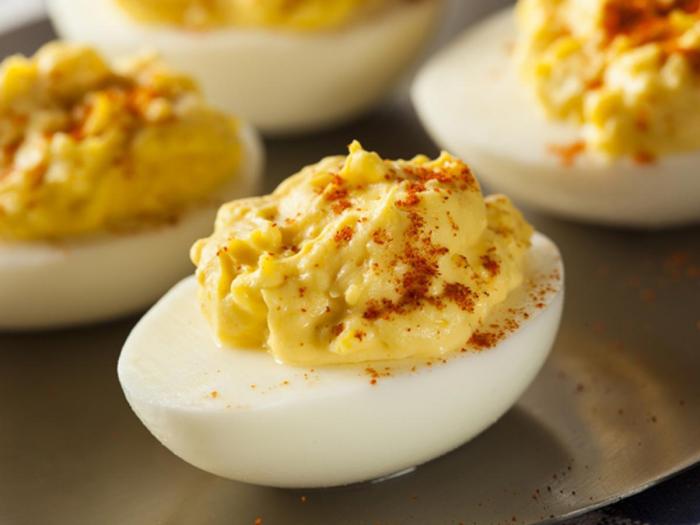Nutritional Composition of Deviled Eggs: Nutrition Facts For Deviled Eggs
Nutrition facts for deviled eggs – Deviled eggs, a classic appetizer, offer a surprisingly nuanced nutritional profile. While often perceived as a rich, indulgent treat, understanding their macronutrient and micronutrient composition allows for informed consumption choices. This analysis will delve into the detailed nutritional breakdown of a typical deviled egg, exploring the impact of ingredient variations on its overall nutritional value.
Macronutrient Breakdown of Deviled Eggs
A single, average-sized deviled egg (approximately 50g) typically contains a balanced mix of macronutrients. The precise amounts can vary depending on the size of the egg and the type of mayonnaise used. However, a reasonable estimate provides a useful starting point for nutritional consideration. Protein, primarily from the egg white, contributes significantly to satiety and muscle building.
Fat, largely from the yolk and mayonnaise, provides energy and essential fatty acids. Carbohydrates, usually present in minimal amounts from the mayonnaise and any added seasonings, contribute less significantly to the overall caloric value. A typical serving might contain approximately 7 grams of protein, 8 grams of fat, and 1 gram of carbohydrate.
Micronutrient Content of Deviled Eggs, Nutrition facts for deviled eggs
Beyond macronutrients, deviled eggs offer a range of micronutrients. The egg yolk is particularly rich in vitamins and minerals. Vitamin A, crucial for vision and immune function, is present in substantial amounts. Vitamin D, essential for calcium absorption and bone health, also contributes to the overall nutritional value. While vitamins E and K are present in smaller quantities, their presence still adds to the nutritional profile.
Several B vitamins, including riboflavin (B2) and choline, support various metabolic processes. Minerals like calcium, crucial for bone health, and iron, vital for oxygen transport, are also found in deviled eggs. Potassium, an essential electrolyte, contributes to fluid balance and nerve function.
Impact of Ingredient Variations
The nutritional profile of deviled eggs is influenced by ingredient choices. Using a full-fat mayonnaise will naturally increase the fat content and calorie count compared to using a reduced-fat alternative. Adding mustard, a common addition, provides additional flavor but minimally impacts the overall macronutrient composition. Similarly, the addition of paprika adds color and flavor without significantly altering the nutritional content.
However, adding significant amounts of extra ingredients, such as bacon bits or cheese, would substantially alter the nutritional profile, increasing fat and potentially sodium content.
Nutritional Information per Serving
| Nutrient | Amount per Serving (approx.) | % Daily Value (approx.) | Notes |
|---|---|---|---|
| Calories | 75-90 | – | Varies based on ingredients |
| Protein | 7g | 14% | Primarily from egg white |
| Fat | 8g | 12% | Includes fat from yolk and mayonnaise |
| Carbohydrate | 1g | <1% | Mostly from mayonnaise |
| Cholesterol | 185mg | 62% | High cholesterol content |
| Sodium | 70-100mg | 3-4% | Varies based on mayonnaise and added seasonings |
| Vitamin A | 10% DV | 10% | Primarily from egg yolk |
| Vitamin D | 5% DV | 5% | Primarily from egg yolk |
Calorie and Fat Content of Deviled Eggs

Deviled eggs, a classic appetizer, offer a delightful blend of creamy yolk and tangy spices. However, understanding their nutritional profile, particularly their calorie and fat content, is crucial for mindful eating. This section delves into the specifics, providing insights into the types of fat present and offering strategies for reducing their overall impact.
Calorie Count per Deviled Egg and Serving Sizes
The calorie count of a deviled egg varies depending on its size and the ingredients used. A standard-sized deviled egg (approximately one-half of a large egg) typically contains around 70-80 calories. Larger deviled eggs, or those made with richer additions like mayonnaise with a higher fat content, will naturally have a higher calorie count. A serving of two deviled eggs would therefore range from 140-160 calories.
It’s important to consider portion size when incorporating deviled eggs into your diet. For example, a serving of three deviled eggs would increase the calorie intake to approximately 210-240 calories.
Types of Fat in Deviled Eggs and Their Health Implications
Deviled eggs primarily contain fat from the egg yolk and added mayonnaise. Egg yolks are a source of both saturated and unsaturated fats. Saturated fats, while necessary in moderation, should be consumed in limited quantities as excessive intake is linked to increased cholesterol levels. Unsaturated fats, on the other hand, are considered healthier fats and contribute to overall heart health.
Mayonnaise, a key ingredient, significantly impacts the fat content, primarily contributing saturated and monounsaturated fats. The type of mayonnaise used – for example, those made with olive oil versus those made with less healthy oils – will influence the fat profile. Trans fats, which are generally considered unhealthy and should be avoided, are typically not present in significant amounts in homemade deviled eggs unless processed oils are used in the mayonnaise.
Comparison of Fat Content with Other Appetizers
Compared to other common appetizers, deviled eggs fall somewhere in the middle in terms of fat content. For instance, a single serving of potato chips or fried mozzarella sticks often contains significantly more fat and calories. However, some appetizers like vegetable crudités with hummus or fruit platters have considerably lower fat content. The key is moderation and mindful choices, understanding the nutritional value of each option within a balanced diet.
Strategies for Reducing Calorie and Fat Content of Deviled Eggs
Reducing the calorie and fat content of deviled eggs can be achieved through several simple strategies:
- Use light mayonnaise or Greek yogurt as a substitute for some or all of the mayonnaise.
- Reduce the amount of mayonnaise used in the recipe.
- Incorporate additional healthy ingredients, such as finely chopped vegetables (e.g., celery, bell peppers) to increase volume and fiber while reducing the overall proportion of mayonnaise.
- Use egg whites in addition to yolks to increase the volume of the mixture and slightly reduce the fat content.
- Season generously with herbs and spices to enhance flavor without adding extra calories or fat.
Cholesterol in Deviled Eggs

Deviled eggs, a popular appetizer, contain a significant amount of cholesterol, primarily derived from the egg yolks. Understanding the cholesterol content and its potential impact on health is crucial for making informed dietary choices. This section delves into the cholesterol profile of deviled eggs, comparing it to other high-cholesterol foods and exploring the role of dietary cholesterol in overall health.Each deviled egg typically contains approximately 185-200 milligrams of cholesterol.
This is because the yolk is the primary source of cholesterol in eggs. While the exact amount can vary slightly depending on egg size and preparation methods, this figure provides a reasonable estimate for a standard deviled egg. The potential health effects of consuming this level of cholesterol are discussed further below.
Dietary Cholesterol and Heart Health
Dietary cholesterol’s role in overall health, specifically its relationship to heart health, is a complex topic that has evolved over time. While high blood cholesterol levels are a known risk factor for heart disease, the impact of dietary cholesterol is less straightforward than previously believed. Current research suggests that saturated and trans fats have a more significant influence on blood cholesterol levels than dietary cholesterol itself.
However, moderation remains key, and individuals with pre-existing heart conditions or high cholesterol should consult with their healthcare providers about their cholesterol intake.
Yo, so checking the nutrition facts for deviled eggs? Pretty basic, right? But then I saw this crazy comparison to poppi soda nutrition facts , like, way different levels of sugar and stuff. Anyway, back to those deviled eggs – gotta watch the cholesterol, fam!
Dietary cholesterol, while a factor, is not the sole determinant of blood cholesterol levels. Saturated and trans fats exert a stronger influence on blood lipid profiles, increasing the risk of cardiovascular disease. Individual responses to dietary cholesterol vary, and a balanced approach to nutrition is essential for heart health.
Cholesterol Content Comparison
The cholesterol content of deviled eggs is comparable to other high-cholesterol foods. For instance, a 3-ounce serving of fried chicken may contain a similar or even higher amount of cholesterol. Similarly, some types of shellfish and organ meats (like liver) are also notably high in cholesterol. However, it’s important to consider the overall nutritional profile of each food.
While deviled eggs are relatively high in cholesterol, they also provide protein and some vitamins and minerals. A balanced diet incorporating a variety of foods is generally recommended, rather than focusing solely on the cholesterol content of individual items.
Deviled Egg Ingredients and Their Nutritional Value
Deviled eggs, a classic appetizer, derive their flavor and nutritional profile from a combination of readily available ingredients. Understanding the nutritional contribution of each component is key to appreciating both the culinary appeal and the potential health implications of this popular dish. This section will detail the nutritional value of each key ingredient, highlighting both benefits and drawbacks.
Nutritional Breakdown of Key Deviled Egg Ingredients
The primary components of deviled eggs—eggs, mayonnaise, mustard, and paprika—each offer distinct nutritional profiles. The following table summarizes their key nutritional characteristics per typical serving size used in a deviled egg recipe. Note that values can vary depending on brand and specific ingredients used.
| Ingredient | Calories (approx.) | Protein (g) | Fat (g) | Cholesterol (mg) |
|---|---|---|---|---|
| Large Egg (1) | 78 | 6 | 5 | 186 |
| Mayonnaise (1 tbsp) | 90 | 0 | 10 | 0 |
| Mustard (1 tsp) | 5 | 0 | 0 | 0 |
| Paprika (1/4 tsp) | 2 | 0 | 0 | 0 |
Eggs: Nutritional Value and Health Implications
Eggs are a powerhouse of nutrients, providing high-quality protein, essential fatty acids, vitamins (like A, D, E, and B vitamins), and minerals (such as choline and selenium). The protein in eggs contributes to satiety and muscle building. However, eggs are also a significant source of cholesterol, which can be a concern for individuals with high cholesterol levels.
The impact of dietary cholesterol on blood cholesterol levels is a complex topic and ongoing research continues to refine our understanding.
Mayonnaise: Nutritional Profile and Variations
Mayonnaise significantly contributes to the caloric and fat content of deviled eggs. The nutritional profile varies depending on the type of mayonnaise used. For instance, full-fat mayonnaise is higher in calories and fat than light or reduced-fat versions. Some brands also incorporate additional ingredients like oils (e.g., olive oil) which can alter the overall nutritional composition and add potential health benefits (e.g., monounsaturated fats from olive oil).
Choosing a lower-fat mayonnaise can reduce the overall calorie and fat content of the deviled eggs.
Mustard and Paprika: Minor Nutritional Contributions
Mustard and paprika contribute minimally to the overall nutritional profile of deviled eggs. Mustard provides a small amount of flavor and spice, while paprika adds color and a subtle smoky flavor. Both are low in calories and fat. Paprika, being a spice derived from peppers, contains small amounts of antioxidants.
Dietary Considerations and Deviled Eggs
Deviled eggs, a classic appetizer, offer a delicious combination of creamy yolks and tangy seasonings. However, their nutritional profile necessitates careful consideration for individuals following specific dietary plans or managing particular health conditions. Understanding how deviled eggs fit into various diets and how to adapt recipes for specific needs is crucial for safe and enjoyable consumption.Deviled eggs can be incorporated into various dietary approaches, albeit with modifications.
Deviled Eggs and Dietary Plans
The nutritional composition of deviled eggs—rich in protein and fat, moderate in cholesterol—influences their suitability for different diets. For example, a low-carbohydrate diet can easily accommodate deviled eggs, as they are naturally low in carbohydrates. Similarly, ketogenic diets, which emphasize high-fat, moderate-protein, and very-low-carbohydrate intake, can include deviled eggs as part of a balanced meal plan. Vegetarians and vegans can enjoy deviled eggs, provided they use plant-based mayonnaise alternatives.
However, the high cholesterol content should be considered for those monitoring their cholesterol levels. Portion control is always advisable.
Modifying Deviled Egg Recipes for Dietary Needs
Adapting deviled egg recipes to accommodate specific dietary needs is relatively straightforward. For individuals with egg allergies, substituting tofu or avocado as a base for the filling provides a similar creamy texture. Those with dairy allergies can utilize dairy-free mayonnaise alternatives readily available in most supermarkets. Reducing the amount of mayonnaise can lower the fat content, while adding spices and herbs can enhance the flavor profile without relying on high-fat ingredients.
For individuals sensitive to certain spices, simply omitting or substituting those ingredients is an easy solution.
Potential Risks of Deviled Egg Consumption
While generally safe, deviled eggs present potential risks for individuals with specific health conditions. The high cholesterol content may be a concern for people with high cholesterol or cardiovascular disease. The creamy texture and preparation method make deviled eggs susceptible to bacterial contamination if not handled and stored properly. Improper refrigeration can lead to foodborne illnesses, particularly for individuals with compromised immune systems.
Careful attention to food safety practices is paramount.
Dietary Modifications for Deviled Eggs
Dietary modifications can significantly impact the nutritional profile of deviled eggs.
- Reduce mayonnaise to lower fat and calorie content.
- Use Greek yogurt instead of mayonnaise for a higher protein and lower fat option.
- Substitute avocado or tofu for a vegan alternative.
- Incorporate low-sodium spices to reduce sodium intake.
- Add vegetables like finely diced bell peppers or chives for added nutrients and flavor.
- Use a low-fat or light mayonnaise to reduce the overall fat content.
Visual Representation of Nutritional Information

Understanding the nutritional content of deviled eggs is best achieved through visual aids. These representations can quickly communicate the relative proportions of macronutrients and highlight differences based on ingredient variations, such as the type of mayonnaise used. A clear visual makes it easier to grasp the nutritional impact of this popular appetizer.Imagine a pie chart illustrating the macronutrient composition of a typical deviled egg.
The largest slice, perhaps occupying 40-50%, would represent fat, primarily from the mayonnaise and yolk. A smaller segment, around 30-40%, would depict protein, largely contributed by the egg white and yolk. The remaining slice, a relatively small portion of 10-20%, would show carbohydrates, mainly from any added seasonings or sweeteners. This visual instantly communicates the high fat content of deviled eggs.
Macronutrient Proportions in Deviled Eggs
The visual proportions of macronutrients in a deviled egg can vary slightly depending on the specific recipe. For instance, using a higher-fat mayonnaise will increase the size of the “fat” segment in our pie chart, proportionally reducing the protein and carbohydrate segments. Conversely, using a lower-fat mayonnaise will shrink the fat slice and enlarge the protein and/or carbohydrate segments. These changes, though seemingly minor, significantly impact the overall nutritional profile.
Visual Differences Based on Mayonnaise Type
Comparing deviled eggs made with different types of mayonnaise offers a compelling visual contrast. Let’s imagine two pie charts side-by-side. One represents a deviled egg made with full-fat mayonnaise; its fat segment would be considerably larger than the other, representing a higher caloric density. The second pie chart, illustrating a deviled egg made with light mayonnaise, would show a smaller fat segment and larger protein and/or carbohydrate segments.
This visual comparison immediately reveals the impact of mayonnaise type on the overall macronutrient balance. The difference in the size of the fat slice would be the most striking visual difference between the two charts.
Creating a Visual Representation
To create a mental image of the nutritional information, consider using simple shapes and proportions. For instance, you could represent the fat content with a large rectangle, the protein content with a smaller rectangle, and the carbohydrate content with a tiny square. The relative sizes of these shapes directly correspond to the percentage of each macronutrient. You can further enhance this visual representation by using different colors to distinguish the macronutrients (e.g., yellow for fat, brown for protein, and white for carbohydrates).
This simple method allows for a quick and effective mental visualization of the nutritional breakdown without requiring any drawing skills. Adjusting the sizes of the shapes allows one to easily compare different deviled egg recipes or the impact of ingredient changes.
Essential Questionnaire
Are deviled eggs high in sodium?
Sodium content varies depending on the mayonnaise and any added seasonings. Opting for low-sodium mayonnaise can significantly reduce the sodium intake.
Can I make vegetarian deviled eggs?
Yes! Deviled eggs are naturally vegetarian, provided you use a vegetarian-friendly mayonnaise.
How long can I safely store deviled eggs?
Deviled eggs should be refrigerated and consumed within 2-3 days for optimal safety and quality.
Are deviled eggs suitable for a keto diet?
Deviled eggs can fit into a ketogenic diet, but portion control is important due to their fat content. Be mindful of the mayonnaise used, choosing one with lower carbohydrate content.
